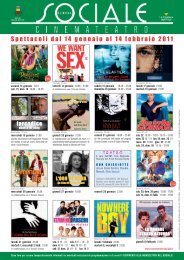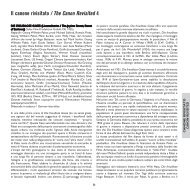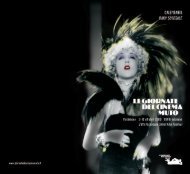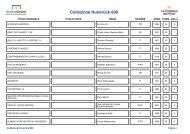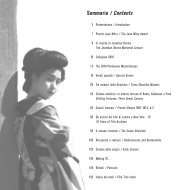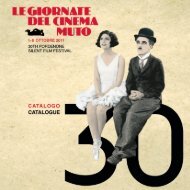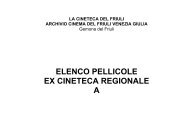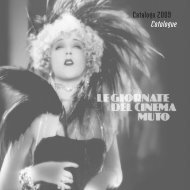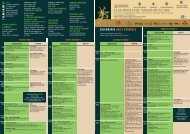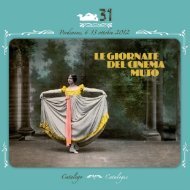Le Giornate del Cinema Muto 2005 Sommario / Contents
Le Giornate del Cinema Muto 2005 Sommario / Contents
Le Giornate del Cinema Muto 2005 Sommario / Contents
You also want an ePaper? Increase the reach of your titles
YUMPU automatically turns print PDFs into web optimized ePapers that Google loves.
four musicians, and a huge stylistic variety. There is no musical style, from medieval music of the 14th century, baroque, and classical, to Brazilian<br />
samba, jazz, folk, and contemporary, which has not been played by at least one or two of the group’s members. And still their credo for silent film<br />
music is simple: not to be louder than the film, to respect it and give it space and freedom, and to take musical responsibility for the unique<br />
demands of each individual film.<br />
KENSAKU TANIKAWA Ha iniziato la sua carriera come pianista e compositore jazz, scrive musica per il cinema dalla metà degli anni ’80. Apprezzato<br />
collaboratore <strong>del</strong> celebre regista Kon Ichikawa, ha composto le partiture di quasi tutti i film da lui diretti, a partire da Rokumeikan (1986) fino a Eiga<br />
joyu (L’attrice; 1987), Yatsuhaka-mura (1996) e Doraheita (2000). In Giappone egli è noto come autore <strong>del</strong>le sigle di popolari programmi televisivi, fra<br />
cui Sono toki rekishi ga ugoita. Oltre ad aver al suo attivo una ventina di dischi, dirige anche degli speciali ensemble musicali, con uno dei quali propone<br />
recite di suo padre, il famoso poeta Shuntaro Tanikawa. Molto interessato al cinema muto – che sta diventando per lui sempre più importante –<br />
accompagna regolarmente film muti, commedie in particolare. Alle <strong>Giornate</strong> <strong>2005</strong> eseguirà la sua musica al pianoforte affiancato da Toshiyuki Sakai<br />
(sassofono alto e flauto) Kota Miki (violoncello) e Kumiko Takara (percussioni). / He began his musical career as a jazz pianist and composer, and<br />
became involved in composing for films in the mid-1980s. A valued collaborator of the celebrated film director Kon Ichikawa, he has composed the scores<br />
for most of his films since 1986, starting with Rokumeikan; other Ichikawa film scores include Eiga joyu (Actress; 1987), Yatsuhaka-mura (1996), and<br />
Doraheita (2000). Some other directors with whom he has worked are Jun Ichikawa and Tatsuya Yamamoto. Tanikawa is now particularly known in Japan<br />
as the composer of the signature themes of some very popular current television programs, such as Sono toki rekishi ga ugoita. In addition, he has<br />
released more than 20 discs of his own compositions and performances, and heads some unique musical ensembles, one of which features recitations<br />
by his father, the famous poet Shuntaro Tanikawa. He is very interested in silent cinema – a field that is becoming increasingly important to him – and<br />
regularly accompanies silent films, especially comedies. At this year’s <strong>Giornate</strong> he will perform his original scores for Daisuke Ito’s Zanjin Zanbaken and<br />
Mikio Naruse’s Yogoto no yume at the piano, accompanied by Toshiyuki Saki (alto saxophone, flute), Kota Miki (cello), and Kumiko Takara (percussion).<br />
152



